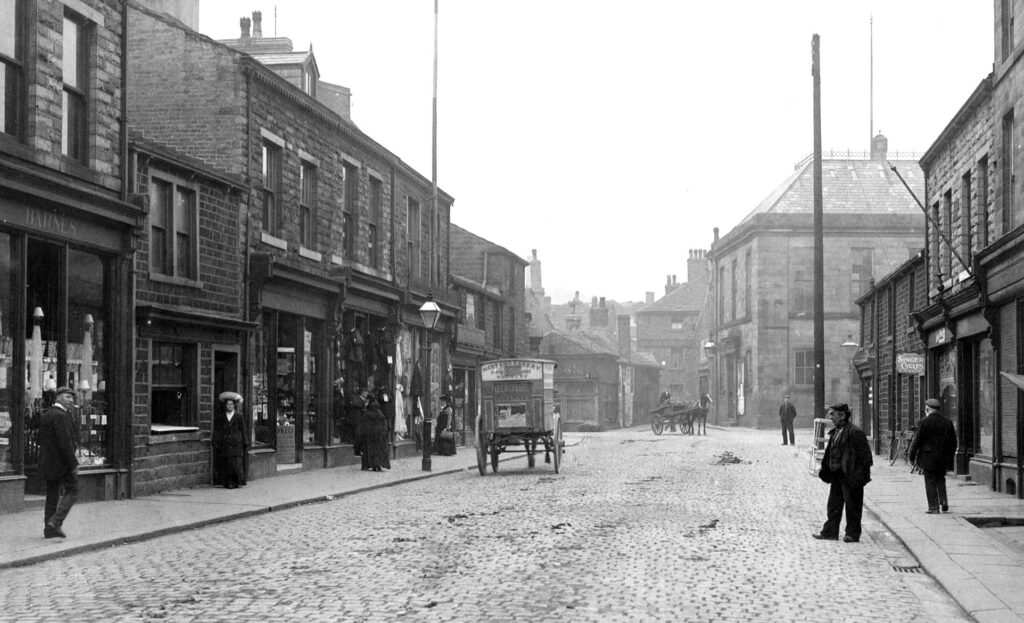The River Irwell was the receptacle for all solid matters that were found to be inconvenient or unprofitable. Old building materials, ashes, and cinders from the houses, and from all the steam engines in the town were poured into the river. The results were inevitable in that the bed of the river was raised which meant whenever there was a great storm the lower lying areas of Bacup flooded. One notable instance of flooding in July 1871 saw the water levels rise to 5 feet 9 inches in St James Street, causing significant damage and disruption to the area
The following is an extract from the Bacup Times newspaper of July 1871.
The afternoon of the flood began as a fine and sultry day and as the day advanced, so the heat increased, and clouds began to gather from the North. By 2 o’clock the sun was so entirely hidden by clouds that the mills and shops had to light the gas lamps. The storm when it burst over the town hit with the force of that of a tropical storm. Vivid flashes of lightning were accompanied by cracks of thunder that felt to shake the very earth. Then came the rain, not in drops or even streams but in great sheets. The two branches of the river that join near the Mechanics Institute soon broke their banks and overflowed. The waters poured down Burnley Road, on one side and the Rochdale and Todmorden roadsides on the other. Bursting through cellars and the main sewers they quickly laid all the low-lying places of the town under water.
In the Todmorden Road area the mill of Mr Maxwell, known as Vale Mill was rendered useless. At Albion Mill which is built over the river, the waters burst through piling smashing loom upon loom breaking iron supports as if they were matchwood. On Burnley Road, the houses bordering the river were flooded, and the parapet walls of the bridges washed away along with a machine shop belonging to Mr Aitken. Many of the counters in the shops of St James Street, were wrenched from their moorings and in all the shops the flood reached but inches from the ceilings. In the midst of all this, the gas was extinguished, due to pipes in the road being broken in all directions.
Horses were swimming about in the streets and carts floated about randomly. A gentleman’s carriage and timbers smashed through the windows of the surrounding houses. At the Waterloo Hotel which is built over the river the water broke through with such force the boards of the bar were pulled up and the landlady Mrs Blakely and some of her regulars had to be hauled up to the higher floors by ropes. With the exception of one mother and child who were in the sitting room and could not get out. The poor woman appeared at the window and stood on the ledge with the child in her arms screaming for help. The Spotland police at this scene came floating down on a hastily built raft made up of planks and clothes props and succeeded in rescuing the woman and child along with Mrs Ashworth Taylor and her children.
In Irwell Street, Yorkshire, Street St James Street, and Back Irwell Street not one piece of pavement was left but all had been swept away leaving massive holes in their wake. At the other end of St James Street, a large bottle of cream of tartar floated out of Mr Mace’s shop and floated onto the shelf in Mr Entwistle’s draper’s shop. A few doors away a widow by the name of Taylor lost her life and two children washed away to the gas yard were saved from drowning.
Opposite the George and Dragon stood a long stone watering trough which was said to be as old as the Inn itself this was washed away in the flood and never recovered. At Mr Utley’s shop at the corner of Union and Irwell Streets, the water stood at 4ft 5ins amongst which Mr Utley was plunging about trying to save his valuable woollen and ready-made goods. Constantly around him swam his brown retriever dog which showed the utmost anxiety for its master’s safety, which it expressed by gently laying hold of him by the arm and trying to force him upstairs by pushing its nose against his back. Whilst Mr Utley kept going upstairs with certain goods it seized any article that floated past him and followed him upstairs with it.
Mr T Ashworth of the Green Man Inn had two pigs one was drowned and the other swam down the road into St James street through Mr Sugden’s draper’s shop and out into the kitchen whereupon it swallowed a half pound of butter that had been swept of a shelf. Before swimming in hot pursuit of a cabbage which it caught and munched up happily.
Edited from the Bacup Times July 1871
